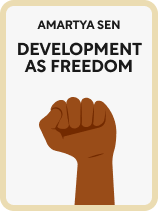

This article is an excerpt from the Shortform book guide to "Development as Freedom" by Amartya Sen. Shortform has the world's best summaries and analyses of books you should be reading.
Like this article? Sign up for a free trial here .
What are the pros and cons of utilitarianism? Does utilitarianism really focus on the greater good?
The theory of utilitarianism seemingly focuses on the happiness of everyone and works to maximize the majority’s well-being. However, as Amartya Sen describes in Development as Freedom, some problems arise from this theory.
Continue reading to learn the pros and cons of utilitarianism to see if it’s really as good as it seems.
Pros and Cons of Utilitarianism
Articulated by British philosopher Jeremy Bentham in the 19th century, utilitarianism is an ethical theory that prioritizes doing the greatest good for most people. It became the predominant theory of ethics throughout the late 19th and 20th centuries and was adopted (in different variations) by prominent economists such as John Stuart Mill and William Stanley Jevons. Sen highlights the pros and cons of utilitarianism to show how it can benefit society, but also tarnish it.
(Shortform note: In this context, “utility” refers to a measure of happiness or satisfaction. The theory is based on the idea that rational people seek to increase their utility or happiness, and that public policy should seek to do the same for society.)
Pros of Utilitarianism
Sen sees two main virtues of this approach. First, utilitarianism is focused on outcomes, meaning the results of policies are more important than processes. Sen believes results must be part of the calculus. Second, the welfare of people is the primary consideration.
Cons of Utilitarianism
Now that we’ve looked at the pros of utilitarianism, let’s look at the cons. Sen identifies four problems with utilitarianism.
- Utilitarianism focuses on total utility and doesn’t consider how utility is distributed among the population—leading to a potential disregard of the lower classes.
- It does not regard freedom as inherently valuable. Freedom is considered important only because of its indirect effect on happiness.
- It overlooks that people can become inured to their situations. For example, some poor people in undeveloped societies may consider themselves happy despite their low standard of living, which severely limits their opportunities.
- Because people have different notions of happiness, comparisons between people don’t work well.
In Defense of Utilitarianism
Some researchers take issue with Sen and other scholars’ interpretations of utilitarianism, arguing they mischaracterize its main tenets. Writing “In Defense of Utilitarianism,” Professor Peter Bowden argues that modern utilitarians do value freedom and that the kind of model expressed by John Stuart Mill in Utilitarianism provides a practical approach to decision-making.
Regarding freedom, if an individual values freedom inherently (as Sen says all people do), then violating their freedom reduces their utility. This fact prevents utilitarians from overlooking freedom, as Sen claims they do. And since in addition to his work on utilitarianism, Mill wrote the book On Liberty, Bowden argues that it’s misguided to act as if he didn’t value freedom for its own sake.
As for practicality, although it’s difficult to make utility comparisons between people, Sen’s preferred method of using democratic means to decide the proper size and scope of positive rights (like social safety net programs) is similarly hard.

———End of Preview———
Like what you just read? Read the rest of the world's best book summary and analysis of Amartya Sen's "Development as Freedom" at Shortform .
Here's what you'll find in our full Development as Freedom summary :
- The five types of freedom that are integral to economic development
- How democracy can prevent famine
- How empowering women helps communities






